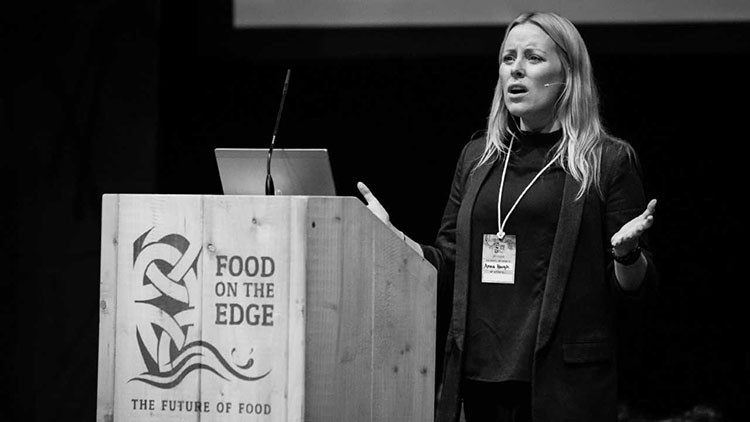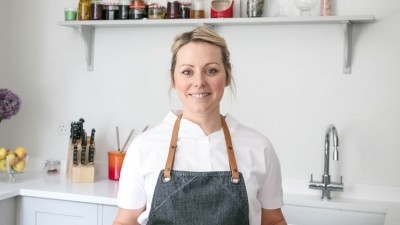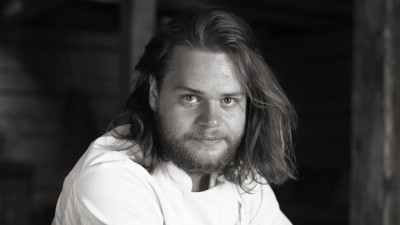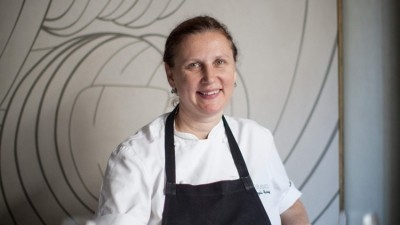“I was shoved and had food thrown at my face” – Anna Haugh on tackling the bullying culture in kitchens

Speaking at Food On The Edge in Galway last month the Irish-born chef discussed her experiences of bullying in restaurants and why what she witnessed as a young chef inspired her to tackle the culture when she began taking charge of the kitchen.
Difficult times
I’ve had 16 years of being a witness to behaviours that didn’t encourage a happy mind. I had some really hard days but even after that I would count myself lucky. I was born in to a good family…and I have the best friends, and those people were like safety nets for me. In general I fared pretty well. Of course I was burned by chefs, I was shoved, had food thrown at my face, plates thrown at my head and called names, the usual stuff…[but] there was always someone who had it so much worse.
I worked a seven-day week, 16 hours a day, but I still think I fared pretty well because I was happy and had good mental health. What helped was when I was going through hard times I didn’t suffer in silence. I’d tell my friends the worst stories in the world and they’d tell me I could keep going.
Vowing to make a change
When I was witnessing some behaviour that wasn’t OK I knew as a junior chef I couldn’t change anything, because when you stand up to your chef you get fired. This was back in the day when we were lucky to be working in Michelin starred restaurants. So I went home to my boyfriend one night and said, I can’t change this [now], but one day when I’m in charge I will not allow a kitchen to be run like this.
Witnessing bullying of a KP in the kitchen
He was the best kitchen porter I’ve ever worked with in my life. One of the chefs took a very strong disliking to him…and would make a mockery of him at least three times a day. This started eating away at me, it would cause more stress than I’ve ever experienced as a chef. Imagine the worst service you’ve ever had, multiply that by 10 and I’d feel that every day.
"I'd like to be known for
being kind and strong.
That’s what every
great chef should be"
I broke my rule about not getting involved as it was too hard to watch on a daily basis. I tried to distract the chef and pull [the KP] away. Now and again I’d say ‘this isn’t cool’ and I’d get in a lot of trouble, I scrubbed a lot of stoves and got a lot of silent treatment. The thing that made it so hard was that the kitchen was silent with their disagreement. Some of them didn’t care, but lots of the chefs were very uncomfortable with what was happening, and weren’t brave enough to say it wasn’t OK. I couldn’t stand up for him alone, I needed more people to do it with me.
The silent kitchen
I wish I spoke up more when I was younger. In our industry, we have a serious problem finding staff, and then once we find them we have a big problem keeping them. The hardest chefs to keep are the 18-24 year olds, who are the most vulnerable. It’s not just because of the fast pace or the stress, it’s because of drink and drugs, the days of them lying in bed, not going out to meet people or make proper connections. Too many of these young chefs are turning to substance abuse. The stuff that I’ve seen in kitchens would upset anybody.
I’ve seen chefs go for a break and then never come back, because the environment was so stressful and scary it was better to lose your knives and your jacket than actually go back and [resign].
"I’ve seen chefs go for a break and never come back.
The environment was so scary it was better
to lose your knives and jacket than go back"
Creating a better kitchen culture
So what do we do? Chefs, bring the subject up as casually as you can in your restaurant. It’s really normal to be low and have self-doubt. Be the person that your chefs will come and talk to, listen to them and let them cry and not be ashamed of it. Encourage the team to take care of each other, if you witness bullying clock it, mention it so everybody can hear. “That’s not how we speak to people here” is a really strong sentence, it’s not aggressive.
Some good people do bad things. Respect breeds respect and bullying breeds bullying, but you can help shape efficient, kind, hard-working chefs. If there are two things I would like to be known for it’s being kind and being strong. That’s what I think every great chef should be, but it’s up to you what you want to be known for.
Anna Haugh was speaking at Food On The Edge, a two-day chef symposium in Galway.










